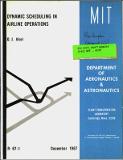Dynamic scheduling in airline operations
Author(s)
Akel, Ollie James
DownloadFTL_R_1967_01.pdf (4.507Mb)
Other Contributors
United States. Office of High-Speed Ground Transportation
Massachusetts Institute of Technology. Flight Transportation Laboratory
Metadata
Show full item recordAbstract
Introduction: Although air transportation has been characterized by rapid development in vehicle design and performance, methods of airline management in the area of vehicle scheduling and control have advanced at a much slower pace. Because of high costs of operation and the pressures of current competition and government controls, effective and efficient use of aircraft is becoming an increasingly essential objective. The goal is to achieve an optimal balance between net revenue to the airline and improved level of service to the customer. Improved return implies higher load factors and air - craft utilization whereas improved passenger service necessitates reduced waits and increased frequencies. These are often conflicting aims. New techniques must be mobilized to give management more useful and adaptive methods of operating and controlling an air transportation system. Perhaps the particular requirements -1- of a very short-haul high density transportation system will lead to more demand responsive approaches. It is with this motivation that this study of dynamic dispatching strategy is undertaken.
Description
December 1967 Includes bibliographical references (leaves 129-130)
Date issued
1967Publisher
[Cambridge, Mass.] : Massachusetts Institute of Technology, Flight Transportation Laboratory, 1967
Other identifiers
09430725
Series/Report no.
FTL report (Massachusetts Institute of Technology. Flight Transportation Laboratory) ; R67-1
Keywords
Airlines, Production scheduling, Electronic data processing, Timetables, Management, Simulation methods